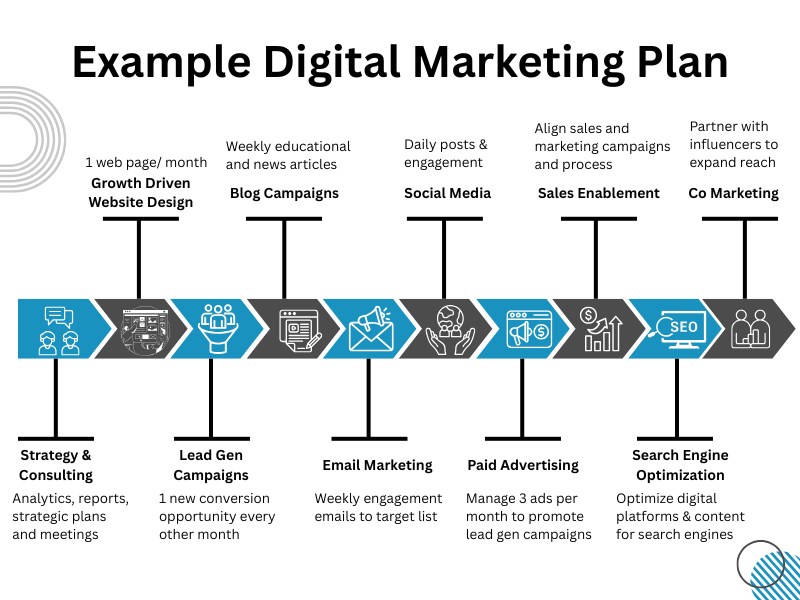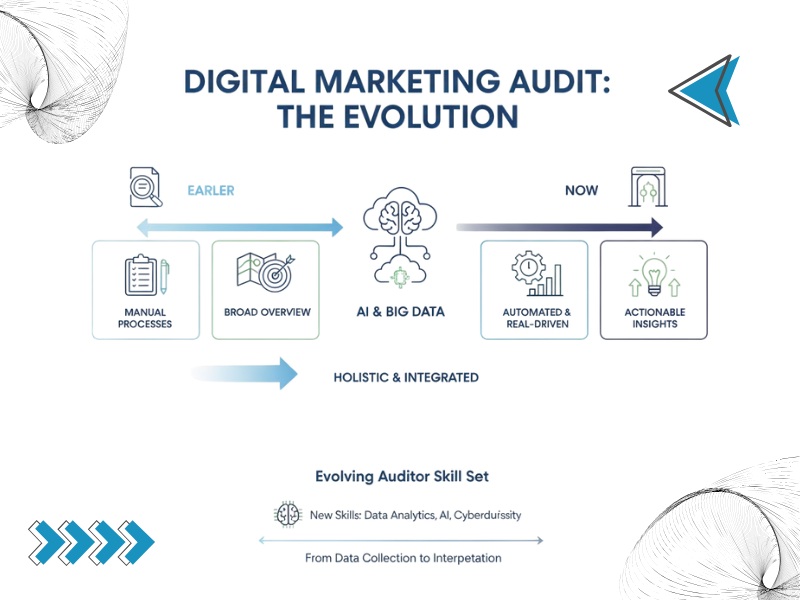
A digital marketing audit is essential to building a robust digital marketing strategy. Understanding what worked well and what needs to change is crucial to implementing the strategies correctly. That said, it is also important to understand how the present-day audit has changed from what it was in the past.
Traditional audits were more focused on organic traffic, keyword ranking, and backlinks. While these are still important, the rise of AI has influenced the rise of Zero-Click search in the form of AI overviews, featured snippets, etc.
Recent advancements have led 70% of digital agencies to run site audits weekly rather than quarterly, aligning with the new ranking priorities set by search engine AI. Here, we will learn about the concept of digital marketing audit, the best practices in the modern era, and a few expert guidelines to help businesses implement it effectively.
Table of Contents
ToggleWhat Is a Digital Marketing Audit?
A digital marketing audit is a thorough evaluation of a company’s online presence, strategy, and performance across all its digital channels. The process involves assessing the effectiveness of various activities, like SEO, social media, paid advertising, and content marketing. This helps identify what’s working, what is not, and the missed opportunities.
Overall, this process helps gather data-driven insights to inform future decisions and optimize strategies for better results. Companies can avail professional digital marketing services to ensure proper audits for better performance.
How to Conduct a Digital Marketing Audit?
It is necessary to understand how to conduct a digital marketing audit in the age of AI. Since the audit will help you get valuable insights and formulate a plan of action, we have put together a step-by-step guide to complete a digital marketing audit to understand your company’s overall marketing performance. As part of this, an SEO audit checklist is essential to ensure that your website’s SEO efforts are aligned with best practices, enabling you to optimize your digital presence effectively.
A. Analyze Your Competitors
The first step is to analyze your competitors. The process involves understanding the strategies of your competitors, their tactics, and performance metrics. You must specifically look at metrics like website traffic, search rankings, open rates, and click-through rates. It is necessary to check their website, social media account, and content marketing efforts to identify areas of improvement.
This competitive analysis allows a human agent in ai strategy to pinpoint exactly where rivals are gaining visibility in automated search results.
B. Evaluate Your Digital Presence
Once you have analyzed your competitors, evaluate your digital presence. Go through everything, from your website design and SEO to your social media presence, to gain a proper understanding of your digital presence and where you are lacking. Presently, you must perform a social media marketing audit as well as your presence on different AI platforms. You can avail professional SEO services to ensure the evaluation is done correctly.
C. Evaluate Your Performance Metrics

The image above shows how a website has performed in the last 3 months with the help of LLM SEO. If you look at it closely, you will see that the website’s position has improved in the last 3 months compared to the previous 3 months. This helps digital marketers decide the next steps to improve performance further.
Next, you must go through your performance metrics and understand what you are doing right and where you need to improve to stay relevant in the market. In this step, focus on how your marketing efforts are performing over a given timeframe. This will help you understand if you need to optimize your digital marketing efforts.
D. Goal Identification
Analyzing performance metrics will give you an idea about both the internal and external environment. Once you get an idea, identify your goals. This will give you a direction for effective digital marketing efforts and help you plan things well. It is wise to set realistic goals to help you stay on track. However, you must review your objectives regularly and adjust them as and when needed.
E. Establish an Action Plan

This is what a digital marketing action plan looks like. You need to take into account all the aspects to ensure better performance of the website.
The final and most important step in the auditing process is to create an action plan. Here, you must list down the areas that need improvement and look for potential solutions. A successful audit is defined by the way you create a plan with all the necessary objectives.
These are the steps to conducting a digital marketing audit.
However, the process and the elements in it have changed over the years. The next section will take you through the ways the audit has transformed over time.
How Has Digital Marketing Audit Transformed Over Time?

Online marketing audits have evolved from being manual, basic reviews to data-driven, AI-powered analyses. With companies focusing on brand visibility in AI search, understanding how digital marketing activities are helping with AIOs, LLMs has become important.
Here’s how the process has transformed:
A. From Broad to Deep and Precise
- Broad and basic – Earlier, audits provided a broad overview of digital presence. The process included a general look at website performance and the digital marketing effectiveness of basic campaigns like banner ads and email blasts. It focused on a high-level view of all elements.
- Deep and data-driven – Present-day audits use data analytics and AI to go deeper. The approach allows for a ‘narrow-yet-deep’ understanding, focusing on specific areas for improvement and suspected problems. It also paves the way for conducting a comprehensive and in-depth understanding of the channel.
- Holistic and integrated – A Digital marketing audit can help understand how different channels and strategies work together to create a consistent customer experience. This is made possible by AI and Big Data.
B. From Manual to Automated
- Manual processes – Earlier audits relied on manual reviews and sampling. The process was time-consuming and often missed key issues.
- Automated and real-time – Presently, audits use technology to automate data collection and analysis. The audit helps in continuous monitoring, thus helping auditors detect risks before they become major problems.
- Advanced analytics – Auditors can use advanced data analytics to process large amounts of data from various sources. This helps in identifying trends, understanding brand perception, and forecasting outcomes.
C. From Strategic Overview to Actionable Insights
- Strategic overview – Previously, the aim was to assess whether the overall strategy aligned with your business goals and whether the branding was consistent across all platforms.
- Actionable insights – The objective has now shifted to providing concrete, data-backed recommendations. The process can involve user journey optimization at specific points in the funnel or identifying market gaps for the business to fill.
D. Evolving Auditor Skill Set
- New skills – Auditors need to learn new technical skills, including data analytics, AI, and cybersecurity, to perform modern audits.
- Shift in focus – An online marketing auditor’s role has transformed from simply collecting data to interpreting it.
- Importance of digital expertise – Presently, the focus is on the skills necessary to audit complex systems and large datasets. This helps in improving audit quality and enhances the ability to identify risks effectively.
That will help you understand how the audit process has changed over time. In the following section, we will take you through what a digital marketing audit examines and the various elements it covers.
Digital Marketing Audit Checklist: What It Examines and Includes?
A proper digital marketing audit examines many factors to determine whether a brand’s marketing activities are paying off. Here are a few key components digital marketing audit examines:
- Your existing website or current performance needs a thorough audit of site analytics on a fundamental level.
- Social media and channel audit to identify existing social media and other channels that are being used, along with their function and performance.
- Audit of access and login to make sure that you have all the usernames and passwords for all channels and analytics.
- An audit of administrators to analyze the admins of all channels and how emails are received.
- Audit of existing sources to understand who is working on your owned channels presently, and the time dedicated daily to each task.
- Auditing the history to understand and check the history of what has been stored in the activity management and previous activity management.
- An audit of the chain of command helps understand who is working on digital activities, each person’s capabilities, and who is responsible for decision-making.
What Is Included in Digital Marketing Audits?
A comprehensive digital marketing audit analyzes key components such as website performance, marketing and SEO, content marketing, social media marketing strategy, paid advertising, and email marketing. The following are the elements included in digital marketing audits:
- Quantitative review – The aim here is to go through your digital activities and understand what’s working and what’s not. The process is done by analyzing measurable results such as GA4 data, CRM reports, or ecommerce purchase data.
- Qualitative review – The review is done to examine the core digital assets and engagements. These include website design and user experience (UX), social media content, and brand messaging.
- Competitor review – A competitive analysis helps analyze the assets and compare them to those of your competitors.
- Channel review – Channel reviews are used to understand and audit each channel independently, and how well they will work together.
- Accessibility – Marketers perform a digital marketing audit to make sure all your channels can be accessed by different target audiences.
All of these will help you understand the importance of audits and how they can help you understand what your website needs and the ways to improve your marketing plans. You can avail yourself of professional digital marketing services to improve your website.
The following section will take you through the best practices to audit your digital marketing channels in the age of AI.
Digital Marketing Strategies 2026: The Best Practices

Source: Search Engine Journal
You now have an idea of how digital marketing has changed, with the focus shifting from traditional SEO to a hybrid approach. Today, combining traditional SEO with AI-based structures is essential to keep your brand alive. So, to ensure you are on the right track, here’s what you must do while performing a digital marketing audit:
A. Can AI Cite Your Content?
Presently, digital marketing auditing is not only about checking for keywords. You have to check the completeness of the content, the factual accuracy, and the authority. Further, you must also track how many times AI engines have cited your content. Also, use the different audit queries to identify gaps where you deserve AI citations, but you don’t have, for that you can contact AI SEO Agencies.
B. Do You Answer Questions Directly?
Ensure all your pages directly answer the questions. Check if every page has sections with proper definitions, answers to frequently asked questions, and summary statements that make it easy for AI to extract and cite. Implement and verify schema markup across all main pages, including FAQ, article, organization, and author schemas.
C. Does It Carry the Necessary Trust Signals?
In the present digital landscape, Google’s EEAT reigns supreme. You have to ensure that your website carries credible author profiles, cites research, and reflects your expertise in the field. It is recommended that you use supporting statistics, recent studies, and case outcomes to make the content AI citation-worthy
D. Does It Cover All Subtopics?
You cannot rely on a one-size-fits-all approach in digital marketing. When performing an audit, check whether your website covers the relevant subtopics in your niche. Check whether you are filling in the gaps and linking the different microtopics internally to related pages. Go through your internal linking strategy for connecting related themes and optimizing for clustering in AI outputs.
E. Are You Monitoring AIO and GEO Performance?
Marketers must set up monthly GEO and AIO performance audits to track visibility in SGE (Google’s Search Generative Experience). It is necessary to analyze visibility and frequency in citations after each technical or content update.
F. Is Your Website Relevant to Local and Real-World?
Local businesses must combine traditional SEO audits with GEO formatting, such as structured FAQs, service location details, and answer boxes for real community queries. It is necessary to ensure local landing pages and reviews are optimized for conversational AI discovery and answer inclusion. Avail professional SEO and content marketing services to improve website relevance.
Before we end this discussion, let’s take you through a few expert guidelines to help you align your digital marketing strategies with the current digital marketing demands.
How to Turn Audit Insights into Action? Expert Guidelines

Source: Search Engine Journal
The work does not end with understanding the various aspects and performing the digital marketing audit. You need to understand and turn the audit insights into action. Here’s what you need to do:
A. Prioritize Recommendations
Go through the audit findings of your audit and understand how this can impact the digital marketing efforts. Rank the action items with respect to impact and effort. Address the most critical issues first, like site errors, missing trust signals, or unoptimized schema.
B. Create an Action Plan
Transform the audit insights into a step-by-step guide to formulate the company’s digital marketing plan. Understand and assign responsibilities, set deadlines for tasks, such as updating content, fixing technical SEO issues, and improving local citations.
C. Align with Business Goals
You must make sure that all actions support the broader business objectives directly. These include boosting leads, improving brand authority, or increasing local visibility.
D. Monitor Results and Iterate
Once you have implemented the changes, track all key performance indicators (KPIs) to measure impact. Make use of ongoing mini-audits and analytics reviews to streamline your strategy with respect to ranking factors and ever-evolving digital landscapes.
E. Communicate Progress
Keep your team and stakeholders updated with the digital marketing audit reports. Highlight completed actions, quick wins, and opportunities identified in the audit.
Understand what a digital marketer does and implement all the strategies properly to get the best results and make your website aligned with the current marketing trends.
Final Thoughts,
Increasing brand awareness, lead generation, and all other aspects rely on your digital audit. Further, your content marketing strategy depends on the auditing and digital marketing campaign analysis of the various aspects of your website. To ensure you are on track, it is necessary to understand the present scenario and formulate strategies accordingly.
Implement all the steps correctly, understand how the digital landscape has changed, and the importance of appearing on all platforms, search engines, and AI platforms.
Frequently Asked Questions
How can a digital marketing audit improve my website and email marketing campaigns?
Examining performance metrics like conversion rate, customer journey, and channel performance can help improve your digital marketing campaign. An audit highlights missed opportunities and bottlenecks in campaigns. The objective of the audit is to guide marketing teams to optimize content, targeting, and budget allocation across media channels to improve campaign effectiveness and the entire marketing performance.
What are the key steps to perform a digital marketing audit?
An effective digital marketing audit involves analyzing website performance, SEO, social media strategy, paid, and organic traffic, content, email marketing, and competitive benchmarking. The process includes both quantitative analysis (Google Analytics data) and qualitative review of brand messaging and user experience. Mapping the customer journey and reviewing marketing budgets and resources are also critical.
How does Google Analytics support a digital marketing audit?
Google Analytics helps get the essential data related to visitor behavior, traffic sources, conversions, and engagement. The audit checks if your Analytics setup is accurate and comprehensive, ensuring that the historical data supports informed decision-making and campaign adjustments.
What is included in a social marketing audit?
A social media audit assesses the brand’s presence across platforms, evaluates audience targeting, account structure, creative effectiveness, and tracking accuracy. The audit will help identify untapped audiences, performance gaps, and opportunities to improve social media marketing aligned with overall digital strategies.


